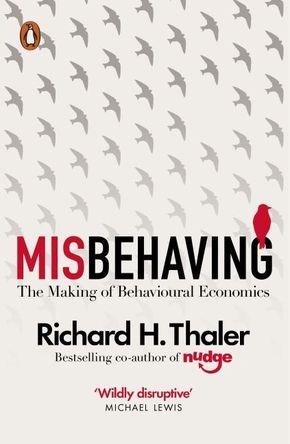
Misbehaving - The Making of Behavioural Economics
| Verlag | Penguin Books UK |
| Auflage | 2016 |
| Seiten | 415 |
| Format | 12,9 x 19,7 x 2,6 cm |
| B-format | |
| Gewicht | 318 g |
| Artikeltyp | Englisches Buch |
| Reihe | The Making of Behavioural Economics |
| ISBN-10 | 0241951224 |
| EAN | 9780241951224 |
| Bestell-Nr | 24195122EA |
The renowned behavioural economist and bestselling author of Nudge, Richard H. Thaler, exposes the irrational tendencies in our thinking and illuminates the way to make clear, logical decisions. He presents his insightful findings with stories about data and experiments and shows us how to avoid making costly mistakes in our own lives.
RICHARD H. THALER: WINNER OF THE 2017 NOBEL PRIZE IN ECONOMICS
Shortlisted for the Financial Times and McKinsey Business Book of the Year Award
ECONOMIST, FINANCIAL TIMES and EVENING STANDARD books of the year
From the renowned and entertaining behavioural economist and co-author of the seminal work Nudge, Misbehaving is an irreverent and enlightening look into human foibles. Traditional economics assumes that rational forces shape everything. Behavioural economics knows better. Richard Thaler has spent his career studying the notion that humans are central to the economy - and that we're error-prone individuals, not Spock-like automatons. Now behavioural economics is hugely influential, changing the way we think not just about money, but about ourselves, our world and all kinds of everyday decisions.
Whether buying an alarm clock, selling football tickets, or applying for a mortgage, we all succumb to biases and make decisions that deviate from the sta ndards of rationality assumed by economists. In other words, we misbehave. Dismissed at first by economists as an amusing sideshow, the study of human miscalculations and their effects on markets now drives efforts to make better decisions in our lives, our businesses, and our governments.
Coupling recent discoveries in human psychology with a practical understanding of incentives and market behaviour, Thaler enlightens readers about how to make smarter decisions in an increasingly mystifying world. He reveals how behavioural economic analysis opens up new ways to look at everything from household finance to assigning faculty offices in a new building, to TV quiz shows, sports transfer seasons, and businesses like Uber.
When economics meets psychology, the implications for individuals, managers and policy makers are both profound and entertaining.
Rezension:
Wildly disruptive Michael Lewis Bloomberg
